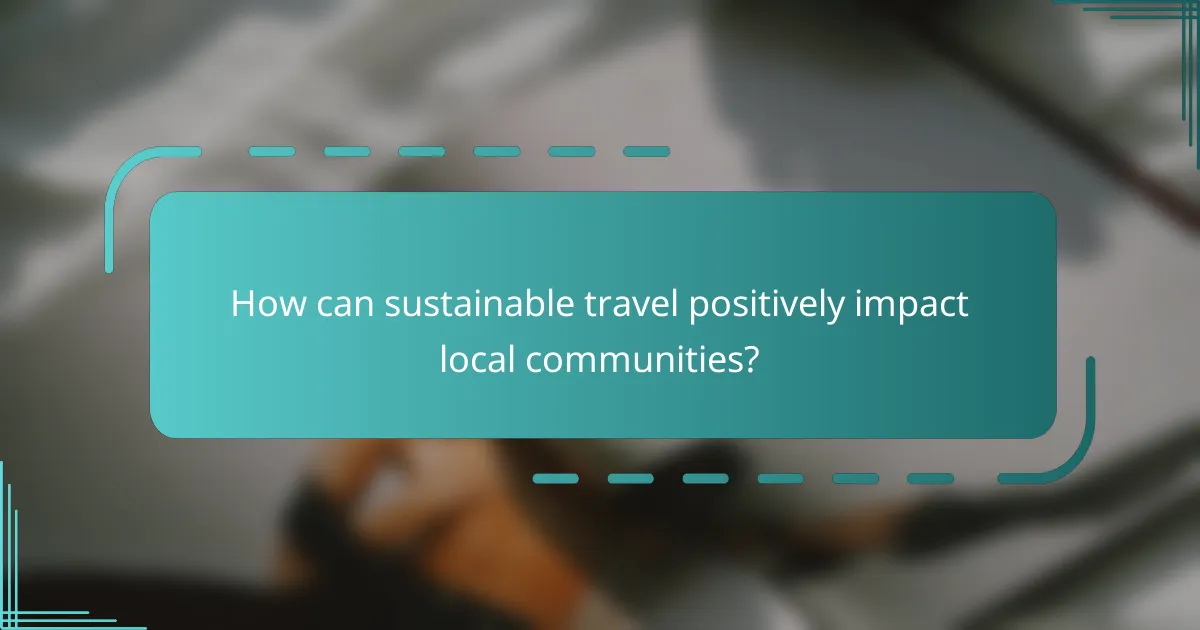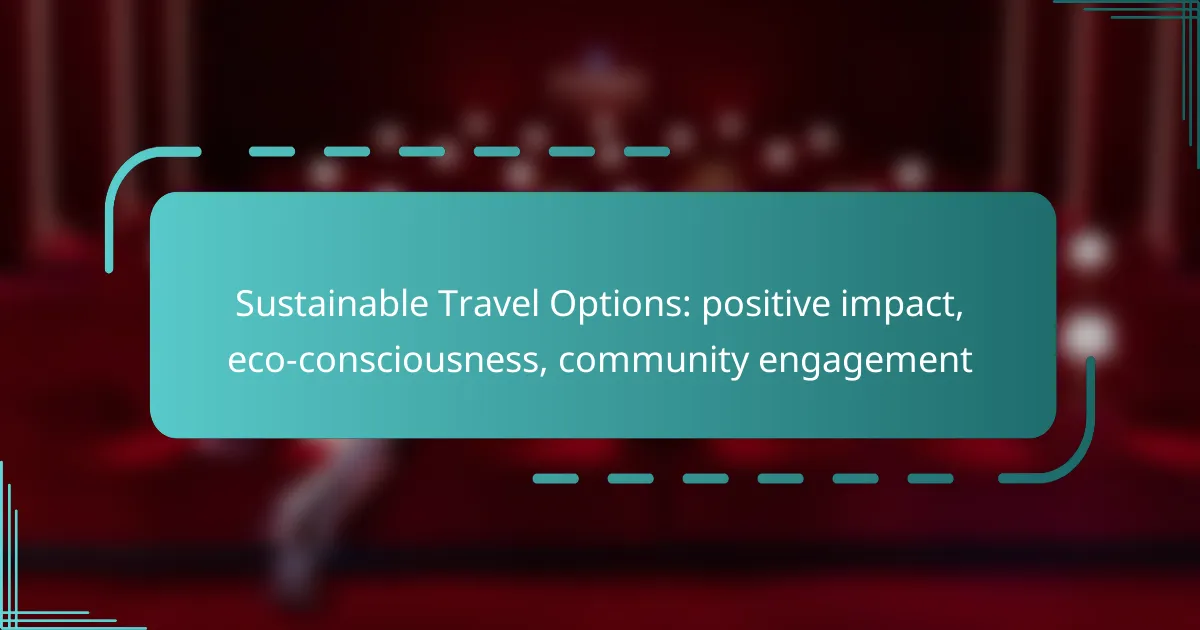Sustainable travel options offer a unique opportunity to explore the world while minimizing environmental impact and supporting local communities. By choosing eco-friendly accommodations, utilizing public transportation, and engaging with local tour operators, travelers can foster economic growth and preserve cultural heritage. Embracing eco-consciousness not only enhances the travel experience but also ensures a positive legacy for future generations.

What are the best sustainable travel options in Europe?
The best sustainable travel options in Europe include eco-friendly accommodations, carbon offset programs, public transportation alternatives, and local tour operators. These options not only reduce environmental impact but also enhance community engagement and support local economies.
Eco-friendly accommodations
Eco-friendly accommodations prioritize sustainability through energy efficiency, waste reduction, and local sourcing. Options include eco-lodges, green hotels, and hostels that have received certifications like Green Key or EarthCheck. When booking, look for properties that utilize renewable energy, offer organic food, and minimize single-use plastics.
Consider platforms like EcoBnB or BookDifferent, which specialize in listing sustainable lodging options. Staying in these accommodations not only reduces your carbon footprint but also often provides a unique experience reflective of local culture.
Carbon offset programs
Carbon offset programs allow travelers to compensate for their carbon emissions by investing in environmental projects, such as reforestation or renewable energy initiatives. Many airlines and travel companies offer the option to purchase offsets during the booking process. It’s a practical way to take responsibility for your travel’s environmental impact.
Before purchasing offsets, research the projects to ensure they are credible and effective. Look for organizations that are certified by standards like the Verified Carbon Standard (VCS) or the Gold Standard, which ensure that projects deliver real, measurable benefits.
Public transportation alternatives
Using public transportation is one of the most effective ways to travel sustainably in Europe. Trains, trams, and buses are often more energy-efficient than cars and can reduce traffic congestion. Many European cities have extensive public transport networks that are reliable and affordable.
Consider purchasing a rail pass, such as the Eurail Pass, which allows unlimited travel on trains across multiple countries. Additionally, many cities offer bike-sharing programs, making cycling a viable and eco-friendly option for exploring urban areas.
Local tour operators
Choosing local tour operators can significantly enhance your travel experience while supporting the community. These operators often focus on sustainable practices, such as small group sizes, responsible wildlife viewing, and cultural sensitivity. They provide insights into local customs and traditions that larger companies may overlook.
When selecting a tour operator, look for those that are certified by organizations like the Global Sustainable Tourism Council (GSTC). Reading reviews and checking their commitment to sustainability can help ensure that your tour has a positive impact on the environment and local communities.

How can sustainable travel positively impact local communities?
Sustainable travel can significantly benefit local communities by fostering economic growth, preserving cultural heritage, and creating job opportunities. By prioritizing eco-consciousness and community engagement, travelers can ensure their visits leave a positive legacy.
Economic benefits through local spending
Sustainable travel encourages tourists to spend money directly in local businesses, which boosts the economy. This can include dining at local restaurants, staying in family-owned accommodations, and purchasing handmade crafts. Such spending helps circulate funds within the community, supporting local jobs and services.
Travelers can maximize their economic impact by choosing to shop at local markets or participating in community-led tours. This not only enhances their experience but also ensures that the financial benefits of tourism reach those who need it most.
Preservation of cultural heritage
Engaging in sustainable travel helps preserve cultural heritage by promoting respect for local customs and traditions. Tourists who participate in cultural experiences, such as traditional festivals or workshops, contribute to the continuation of these practices. This fosters a sense of pride among locals and encourages the younger generation to maintain their cultural identity.
Moreover, sustainable tourism often emphasizes responsible behavior, such as respecting sacred sites and participating in conservation efforts. This collective effort can lead to a stronger commitment to preserving local history and traditions for future generations.
Job creation in eco-tourism
Eco-tourism creates job opportunities in various sectors, including hospitality, guiding, and conservation. As interest in sustainable travel grows, communities can develop eco-friendly initiatives that require skilled labor, thus providing employment for local residents. This not only reduces unemployment but also empowers individuals with new skills.
Additionally, eco-tourism often involves training programs that equip locals with knowledge about sustainable practices. This can lead to long-term career paths in environmental management, hospitality, and cultural education, further benefiting the community as a whole.

What are the key principles of eco-conscious travel?
Eco-conscious travel focuses on minimizing environmental impact while enhancing the experience for local communities. Key principles include reducing carbon footprints, supporting local economies, and respecting wildlife and nature.
Minimizing carbon footprint
Minimizing your carbon footprint is essential for eco-conscious travel. This can be achieved by opting for sustainable transportation options, such as trains or buses, instead of flying, which typically has a higher carbon output.
When traveling, consider using public transport, biking, or walking to explore your destination. Additionally, choose accommodations that prioritize sustainability, such as those with energy-efficient practices or certifications like Green Key or EarthCheck.
Supporting local economies
Supporting local economies is a vital aspect of eco-conscious travel. Engage with local businesses, such as markets, restaurants, and artisans, to ensure that your spending benefits the community directly.
Participate in community-based tourism initiatives, which often provide authentic experiences while promoting local culture. Look for tours led by local guides, and prioritize locally sourced products and services to enhance your travel experience while contributing to the economy.
Respecting wildlife and nature
Respecting wildlife and nature is crucial for sustainable travel. Always observe wildlife from a distance and avoid activities that disturb their natural habitats, such as feeding animals or participating in unethical wildlife tours.
Follow established guidelines in natural reserves and parks, such as staying on marked trails and adhering to regulations regarding camping and fires. By practicing responsible tourism, you help preserve the environment for future generations while enjoying the beauty of nature.

How to choose eco-friendly travel options?
Choosing eco-friendly travel options involves selecting modes of transportation, accommodations, and activities that minimize environmental impact while supporting local communities. Focus on sustainable practices, certifications, and the overall carbon footprint of your travel choices.
Researching certifications
Look for travel companies and accommodations that have recognized eco-certifications, such as Green Key, EarthCheck, or LEED. These certifications indicate adherence to environmental standards and practices that promote sustainability.
When researching, check the specific criteria for each certification, as they can vary significantly. For instance, some may focus on energy efficiency, while others emphasize waste reduction or community engagement.
Evaluating environmental impact
Assess the environmental impact of your travel options by considering factors like carbon emissions, resource usage, and waste generation. For example, traveling by train typically has a lower carbon footprint compared to flying.
Use online calculators to estimate the carbon emissions of your travel plans. Aim to choose options that minimize your overall impact, such as direct flights or accommodations that utilize renewable energy sources.
Reading traveler reviews
Traveler reviews can provide insights into the eco-friendliness of accommodations and activities. Look for comments that mention sustainability practices, such as recycling programs, water conservation efforts, or local sourcing of food.
Pay attention to reviews that highlight community engagement and support for local economies. This can indicate a commitment to responsible tourism, which benefits both the environment and local residents.

What are the benefits of community engagement in travel?
Community engagement in travel fosters meaningful connections between travelers and local populations, enhancing the overall travel experience. It promotes cultural exchange, supports local economies, and raises awareness of social and environmental issues impacting the community.
Enhanced cultural experiences
Engaging with local communities allows travelers to immerse themselves in authentic cultural practices and traditions. This can include participating in local festivals, learning traditional crafts, or enjoying home-cooked meals prepared by residents. Such experiences often lead to a deeper appreciation of the destination and its heritage.
Travelers can seek out community-based tourism initiatives that prioritize cultural exchange, ensuring their experiences are both enriching and respectful. For instance, staying in locally-owned accommodations or joining guided tours led by community members can enhance cultural understanding.
Stronger community ties
Community engagement helps build stronger relationships between visitors and residents, fostering mutual respect and understanding. When travelers support local businesses, they contribute to the economic sustainability of the area, which can lead to improved community resources and infrastructure.
Participating in volunteer opportunities or community projects during travel can further strengthen these ties. For example, joining a beach cleanup or helping in a local school can create lasting bonds and demonstrate a commitment to the well-being of the community.
Increased awareness of local issues
Engaging with local communities allows travelers to gain insights into the social, economic, and environmental challenges faced by residents. This awareness can lead to more responsible travel choices and advocacy for sustainable practices. Understanding issues such as over-tourism or environmental degradation can motivate travelers to support initiatives that promote conservation and social equity.
Travelers can educate themselves by attending community meetings, visiting local NGOs, or participating in workshops that address these issues. This not only enriches their travel experience but also empowers them to make informed decisions that positively impact the communities they visit.

What are the challenges of sustainable travel?
Sustainable travel often faces several challenges that can deter eco-conscious travelers. Key issues include higher costs associated with eco-friendly options and limited availability of such choices in certain regions.
Higher costs of eco-friendly options
Eco-friendly travel options typically come with higher price tags compared to conventional alternatives. This can include more expensive accommodations, organic food choices, and carbon offset programs. Travelers should budget accordingly, as these costs can range from 10% to 50% more than standard options.
To manage expenses, consider booking eco-lodges during off-peak seasons or using local transportation instead of rental cars. Researching and comparing eco-friendly options can help identify the best value for your budget.
Limited availability in certain regions
In many areas, sustainable travel options are not widely available, particularly in remote or less developed regions. This can limit choices for accommodations, dining, and activities that prioritize environmental responsibility. Travelers may need to plan ahead to find suitable options.
To overcome this challenge, use online platforms that specialize in sustainable travel or consult local tourism boards for recommendations. Engaging with local communities can also lead to discovering hidden gems that support eco-conscious practices.
